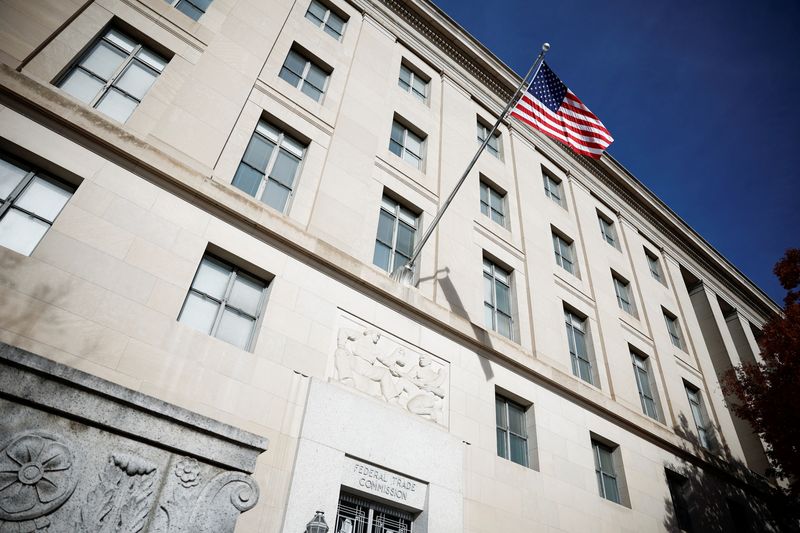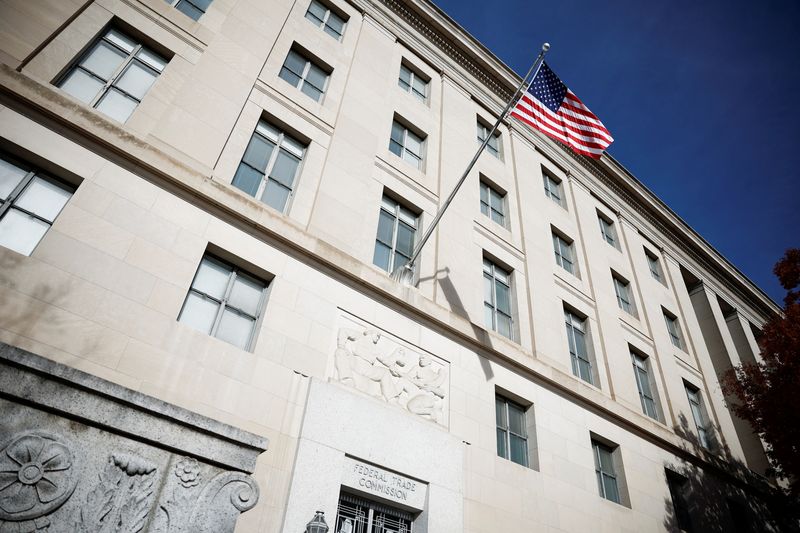
By Ahmed Aboulenein and Amina Niasse
WASHINGTON (Reuters) -The nation’s three largest pharmacy benefit managers have significantly marked up the prices of certain medicines, including for heart disease, cancer and HIV, at their affiliated pharmacies, the U.S. Federal Trade Commission said on Tuesday.
From 2017 to 2022, the companies — UnitedHealth Group (NYSE:UNH)’s Optum, CVS Health (NYSE:CVS)’s CVS Caremark and Cigna (NYSE:CI)’s Express Scripts — marked up prices at their pharmacies by hundreds or thousands of percent, netting them $7.3 billion in revenue in excess of the acquisition costs of the drugs, the FTC said in its second report on the industry.
“The $7.3 billion is the difference between what they are reimbursing themselves and what it is estimated to cost them to acquire the drug,” an FTC spokesperson told reporters in a press briefing, adding that the figure was “probably an underestimate.”
Pharmacy benefit managers, or PBMs, act as middlemen between drug companies and consumers. They negotiate volume discounts and fees with drug manufacturers on behalf of employers and health plans, create lists of medications that are covered by insurance, and reimburse pharmacies for prescriptions.
The FTC prioritized testimony from drugmakers and pharmacies, industries that benefit from weakening PBMs, said David Whitrap, vice president of external affairs at CVS Health.
An Optum spokesperson said the company lowers the cost of drugs and had helped patients save $1.3 billion in 2024.
A spokesperson for Cigna’s Express Scripts described the report’s findings as misleading, saying the calculations are based on a subset of medications that represent less than 2% of what our health plans spend on medications in a year.
The report said dispensing patterns suggested the companies were steering more profitable prescriptions, ones marked up more than $1,000 per prescription, to pharmacies that their parent companies own.
They also paid those pharmacies more than unaffiliated pharmacies for nearly every drug in the study, the report said.
In 2021, patient out of pocket costs for these drugs were at $279 million, an annual compound increase of 14%-21% since 2017, the report found.
The companies were generating an additional $1.4 billion over the study period from spread pricing – the practice of billing plan sponsors more than they reimburse pharmacies for drugs.
The FTC sued the three PBMs in September, accusing them of steering diabetes patients toward higher priced insulin products in order to reap millions of dollars in rebates from drugmakers.
The companies say the suit is baseless and defend their practices. CVS, UnitedHealth and Cigna in October asked the FTC to disqualify Chair Linda Khan from the insulin suit, citing alleged bias against their pricing model.
“We’re confident that our actions are going to be upheld in the litigation, and we’re not going to be distracted from our duty to inform the public and policy makers by the PBM scare tactics,” the FTC spokesperson said on Tuesday.
Khan’s term as chair officially expired in September. President-elect Donald Trump will be inaugurated Jan. 20 and has picked current Commissioner Andrew Ferguson to succeed Khan.
The FTC spokesperson said it was confident that Ferguson and other Republican commissioners support the FTC’s work on PBMs.

